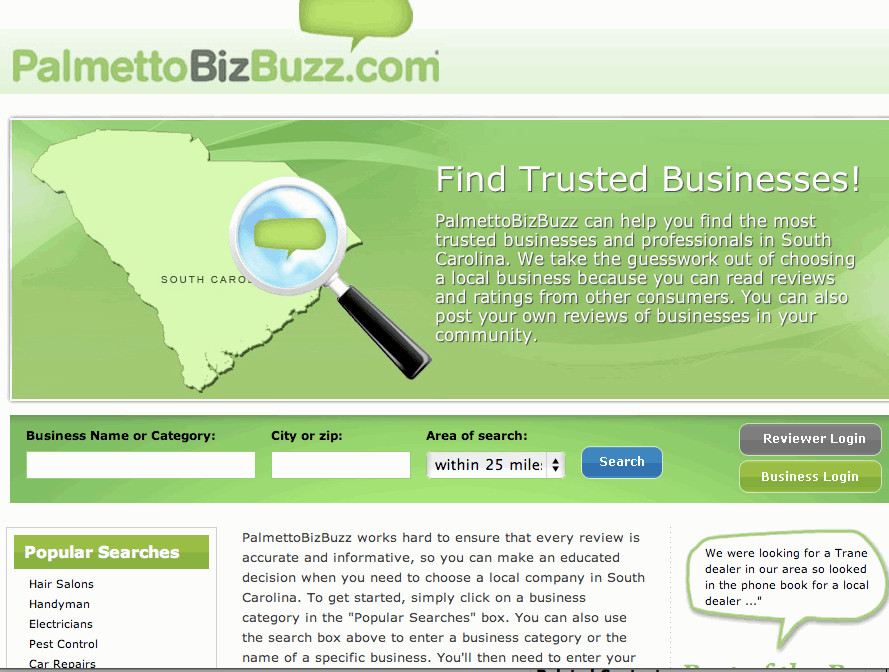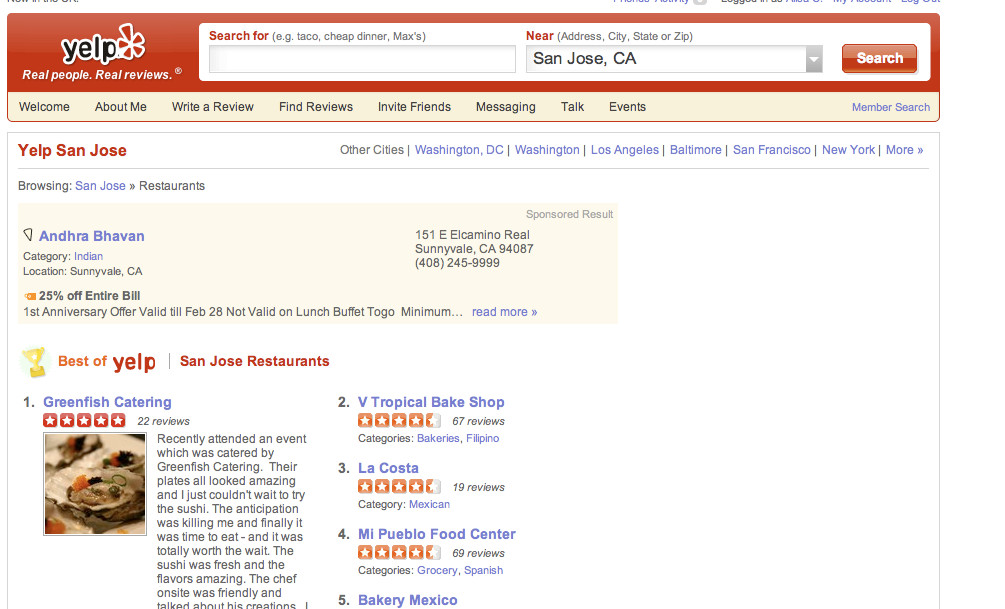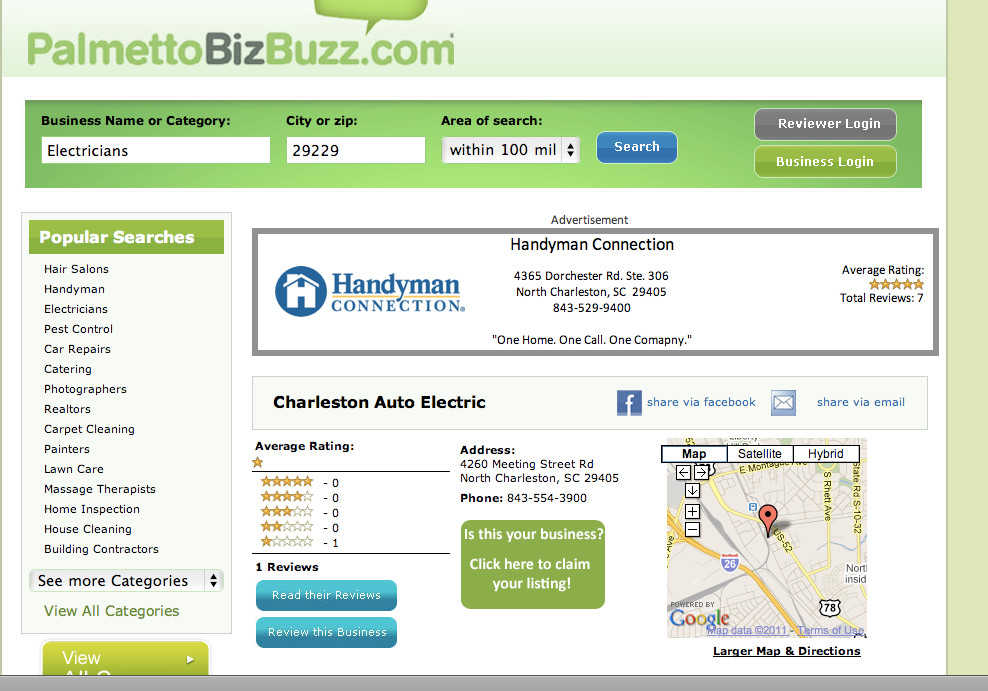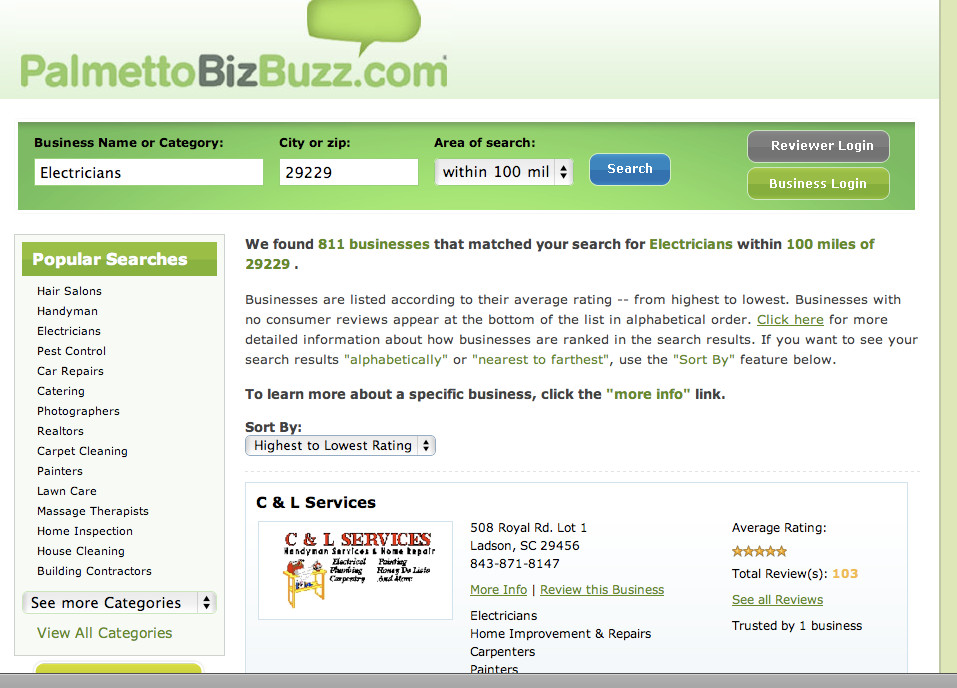BizzBuzzSearch aims to take on Yelp in smaller markets
Directory initiative: BizzbuzzSearch.com
Ownership: Spun off from Evening Post Company, Bizzbuzz Search LLC was purchased by former Evening Post Digital President Ward Lassoe
Model: While label review-oriented directory
Key executive: Ward Lassoe, CEO
Background: The Evening Post wanted to create a directory as a separate brand in South Carolina, its home-base. The company was operated separately from the newspaper company and ultimately sold to its key executive (The Evening Post eventually developed a local directory on a different model and platform, Shopbrazos.com, reviewed here.) BizzBuzzSearch has been redesigned to take advantage of lessons learned with aims of expanding nationally.
Strategy: The Evening Post online team decided to focus on developing a user-reviewed site that would compete with Yelp but have some key advantages.
"The biggest difference with Yelp is the concentrated focus on a narrow geographic segment," Lassoe said. The interface isn't as fast and sleek as Yelp's, but the ranking system also improves upon the original by fixing issues users and businesses have with Yelp's uncontroled environment. Here's an outline of the new strategic approach:
1. List of guidelines for reviews
Guidelines forbid bad language and include other restrictions:
•The review must be written by an actual customer of the business or someone who attempted to become a customer.
•The review must accurately describe the customer's experience with the business.
•The review must only describe the customer's experience with the business.
•Current or former employees/owners of a business may not review their own business.
•Current or former employees/owners of a business may not review a competing business.
•The review of a business may not mention a competing business.
•The review of a business may not include a website address.
•Negative reviews (1 or 2 stars) must include SPECIFIC details about why the customer was dissatisfied.
2. Every review is screened
"If we do have a review that doesn't pass the smell test, send it back with guidelines and give the reviewers the option to send it back again, correctly."
3. A transparent rankings engine
Like Yelp, businesses can upgrade their business record to a premium listing, and premium ads run first, with the order of premium listings still determined by the quality and quantity of reviews.
However, unlike Yelp's secret algorythm, BizzBuzzSearch's ranking system is clear-cut: Businesses with the highest average review rating go to the top, and if there is a tie, the number of reviews for that business determines the top rank. This transparency encourages businesses to encourage reviews, and the rules of the game are clear.
4. An aggressive local launch strategy
Before launch, Lassoe says he made sure that there were a few reviews in all the top categories (a common theme in all successful marketplace sites launching at the local level is this focus on investing in building the core marketplace rather than waiting for it to happen).
"The basic way to acquire reviews is through a street team, college kids with lap tops and incentive gift cards to give out to people, who can win them if they write two reviews. It's amazing how quickly these teams can turn it over. Another way is to partner with a local charity, and ask people to post a reviews in exchange for the media company making a donation.
"The nice thing is get a buzz going...before the launch."
Lassoe bought the company from the Evening Post a year ago and spent six more months revamping the design. BizzBuzz is now active in a South Carolina and Kentucky, and currently looking for local media partners on a white label basis. In addition to traffic promoting the site, media partners can leverage their sales force by making BizzBuzzSearch part of an upsell or package, or by selling over the phone.
"Inside reps have a big advantage by calling people who have already claimed the free listing, know the site and who have gotten some additional features for free," especially businesses that have good reviews.
Media partners can white label the platform and set their own rates. BizzBuzz plans to charge a fee to partners to set up the platform (in a friendly $1000 to $3000 range), a monthly hosting fee, and a rev share of about 10%.
Lassoe says he is currently targeting small to mid-sized markets; "anything but the top 10 the 15. If you put the promotional power of a local media company behind this, you can own the review space in your market."
He points out that Yelp has challenges that include class action suits, credibility issues and concerns with manipulation of reviews.
"There's a space for a player who puts the readability of the reviews as the number one priority. If we have a concern about a review we will immediately suspend it from the site until there is an investigation."
"Now we are looking at medium-sized cities, such as Bakersfield or Raleigh, North Carolina. In New york, Yelp has got so much of a toe-hold so its going to be tough to compete....but if you are in a small city, at some point someone is going to own the consumer review space in your market."
Results: In Charleston where the site originally launched, there are now 50,000 listings, and the sell-through at the site's peak was about 1%. In some ways the experiment has not taken hold, since the company was spun off and listings have slowed. But that could easily change.
"Right now the sell-through taken a step back because the sites are no longer (fueled by) existing media companies, but we are looking to partner with a TV station in South Carolina or Kentucky." Some categories have 100 plus reviews for the top ten or so businesses in South Carolina, including categories like electricians in a particular zip code, showing an appetite for the model has developed.
"Typically with a business directory, a business has no reason to get involved. With a review directory, however, they do. They can have window stickers and other ways to drive people to see reviews and to get more reviews. Our businesses become our best marketers."
Lessons learned
1. Integrate with the media partner as much as possible
"At The Evening Post, if I had to do it all over again, I would have made more of an effort to bring the local sales team along and get them included in the whole process so that they felt more comfortable with it. You really need to get people in the building excited. This was set up as a different brand, statewide, instead of a search product rolled into the newspaper site. Launching as a separate site, statewide over four counties, set up an artificial boundary."
2. Keep standards for reviews high
"One thing we bring to the table is the experience of working with a local media sales force. With the reviews, it's thorny: What if someone writes a bad review? That is why (talking about) the validiaty of the review is so important. We also know how many (reviews) do you need, and how to you go about getting these reviews."
3. Achieve critical mass quickly
"We take the number of businesses, and if you have about 5% with reviews when you launch, it feels like the site has critical mass to it."
4.Take a long range point-of-view
"A lot of media companies just want an easy partnership, you put a link on your site and get a rev share. But all you are doing is building-up Local.com. With this site you are building up something that is going to have some real staying power. This is UGC in its purest form; all the value is provided free by the consumers and the businesses."
Our take: One big partnership away from success or?
For smaller markets where ownership of the review-space has not been claimed, the concept of a review directory solution seems better overall than a standard co-branded IYP directory, even if it takes some extra effort to get it launched.
Possibly, the two can co-exist, since IYP's are basically already just a strategy to sell organic search, and depending on the Google algorythm of the week, having multiple directory plays gives businesses a better shot at being on the first page of their category.
We like Lassoe's real world experience in gathering reviews; a key factor in successful directory and marketplace start-ups is attention to creating that first, critical mass market. It has to be done en masse, right away. And he understands working with local media.
Weaknesses include the lack of a current media partner/and or venture capital backing as yet. Other critques are design-related: Yelp screams "Reviews here!" from the first element on the home page. The PalmettoBizzBuzz's overly explanatory home page makes you scroll down to click on a button to find a listing; when the actual listing channel page pops up, you have to scroll down again past the paragraph explanation to see reviews. Ditto on the listing page. And the load time is a little slow. Yelp loads instantly and shows reviews immediately at every level.
Lassoe says these elements were constructed in response to customer feedback. He may be right. There are no experts, only visionaries, in the marketplace space. It's just too new.
We're also are not sure why Evening Post, after investing in the project, would have sold it off to a former employee and started over with a more traditional model.
To go it alone, with this kind of strategy, sites could require investment in software of close to $500,000, plus the cost of the management team and overhead. And for companies who want to own the review space this platform meets the Newspaper Next's criteria of one disruptive improvement (over the Yellow Pages) and "good is enough." Finally, user-generated content performs incredibly well on search engines.
The most telling sign of the future - whatever the final outcome in each market - is that newspaper and broadcast inside sales experts we talked to do not want to sell standard IYP directory models - but like these UG features. The acid test may be, do top reps want to sell it?

The author, Alisa Cromer is publisher of a variety of online media, including LocalMediaInsider and MediaExecsTech, developed while on a fellowship with the Reynolds Journalism Institute and which has evolved into a leading marketing company for media technology start-ups. In 2017 she founded Worldstir.com, an online magazine, to showcases perspectives from around the world on new topic each month, translated from and to the top five languages in the world.













